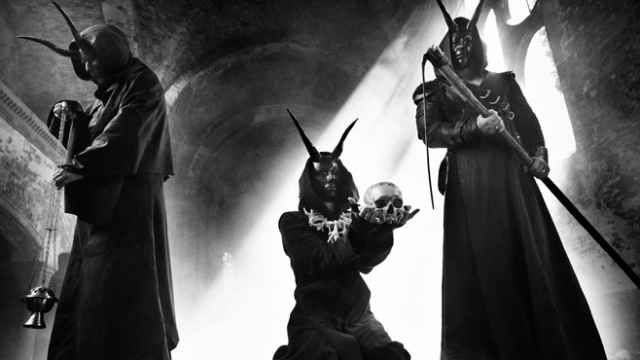America's best-selling death metal band Cannibal Corpse has seen most of its shows in Russia canceled on technicalities among protests by Christian fundamentalists.
The latest cancellation, which took place on Sunday in St. Petersburg hours before the show, left death metal fans clashing with riot police, a reporter with Ekho Moskvy radio wrote on Twitter.
Police denied that any rioting had taken place but said 18 people were detained for misconduct, local online news site Fontanka.ru said Monday.
Cannibal Corpse was scheduled to play eight shows in Russia throughout September and October, but five were canceled on technicalities and one, in Nizhny Novgorod, over a sudden raid by drug police.
Enraged fans took to social networks to blame Christian fundamentalists for putting pressure on local authorities, though no officials confirmed this theory.
Adding some credence to that version of events, however, authorities in the southern city of Krasnodar reportedly allowed Cannibal Corpse to play on the condition that the band remove all its "extremist" songs from the playlist.
The campaign against the band was spearheaded by controversial Christian activist Dmitry "Enteo" Tsorionov, who previously protested shows by Slayer and Marilyn Manson.
Tsorionov, notorious for having physically assaulted supporters of Russian punk band Pussy Riot, slammed the death metal patriarchs on social networks as "blasphemous" and "satanic."
This is not the first time extreme metal bands have fallen afoul of authorities and hard-line Christians in Russia, which has embraced ultraconservative policies in the past few years.
In May, legendary Polish satanist metal band Behemoth was expelled mid-tour over visa issues — also after protests by Christian fundamentalists.
In June, the Marilyn Manson show in Moscow was canceled after a bomb threat was called in at the venue. The band's fans blamed Tsorionov, though he denied involvement.
Cannibal Corpse, founded in 1988 and boasting sales of more than a million albums in the U.S., is known for a blend of distorted guitars, growling vocals and ultra-offensive gore-filled imagery in both the lyrics and album-cover art.
A Message from The Moscow Times:
Dear readers,
We are facing unprecedented challenges. Russia's Prosecutor General's Office has designated The Moscow Times as an "undesirable" organization, criminalizing our work and putting our staff at risk of prosecution. This follows our earlier unjust labeling as a "foreign agent."
These actions are direct attempts to silence independent journalism in Russia. The authorities claim our work "discredits the decisions of the Russian leadership." We see things differently: we strive to provide accurate, unbiased reporting on Russia.
We, the journalists of The Moscow Times, refuse to be silenced. But to continue our work, we need your help.
Your support, no matter how small, makes a world of difference. If you can, please support us monthly starting from just $2. It's quick to set up, and every contribution makes a significant impact.
By supporting The Moscow Times, you're defending open, independent journalism in the face of repression. Thank you for standing with us.
Remind me later.





